Unit 2 Learning English is fun! 期末复习考点讲义(含答案) 2024-2025学年七年级上册英语冀教版(2024)
文档属性
| 名称 | Unit 2 Learning English is fun! 期末复习考点讲义(含答案) 2024-2025学年七年级上册英语冀教版(2024) | 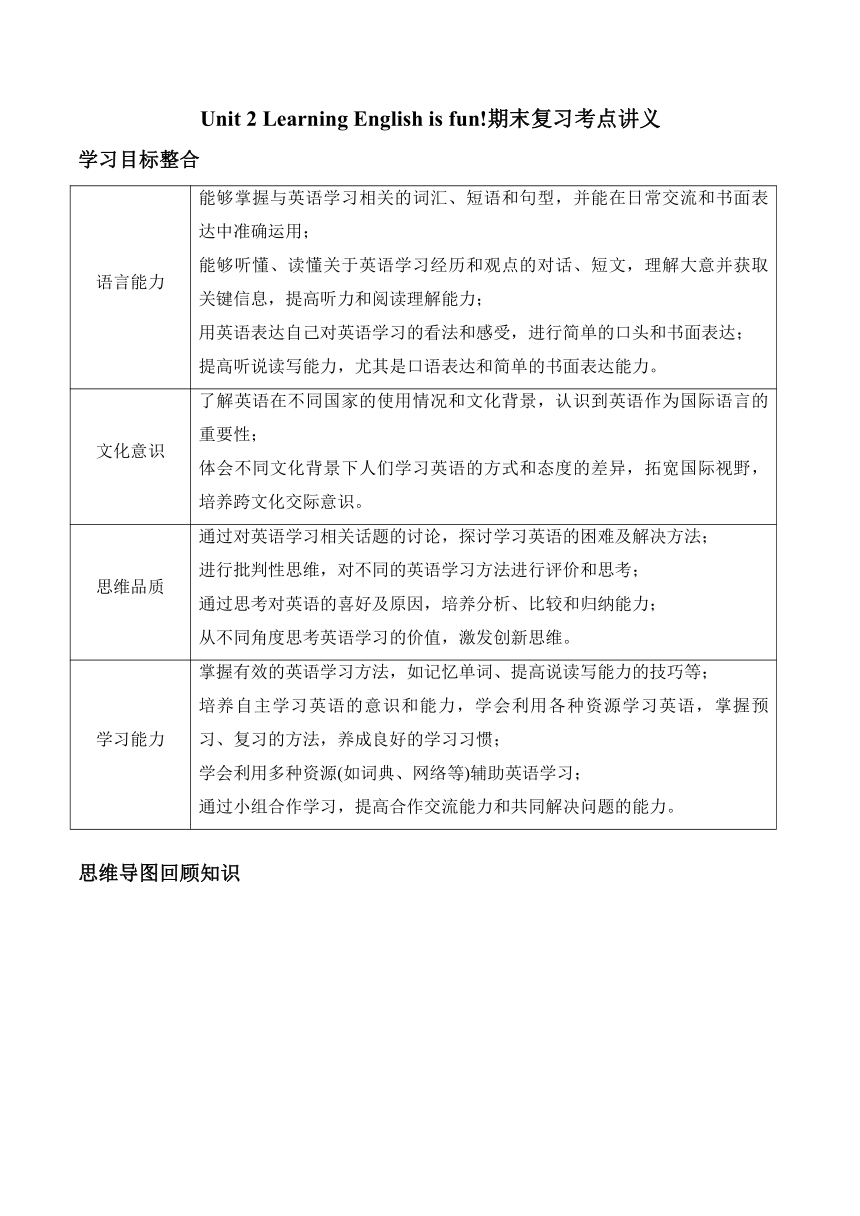 | |
| 格式 | docx | ||
| 文件大小 | 144.3KB | ||
| 资源类型 | 教案 | ||
| 版本资源 | 冀教版 | ||
| 科目 | 英语 | ||
| 更新时间 | 2024-12-24 11:55:10 | ||
图片预览

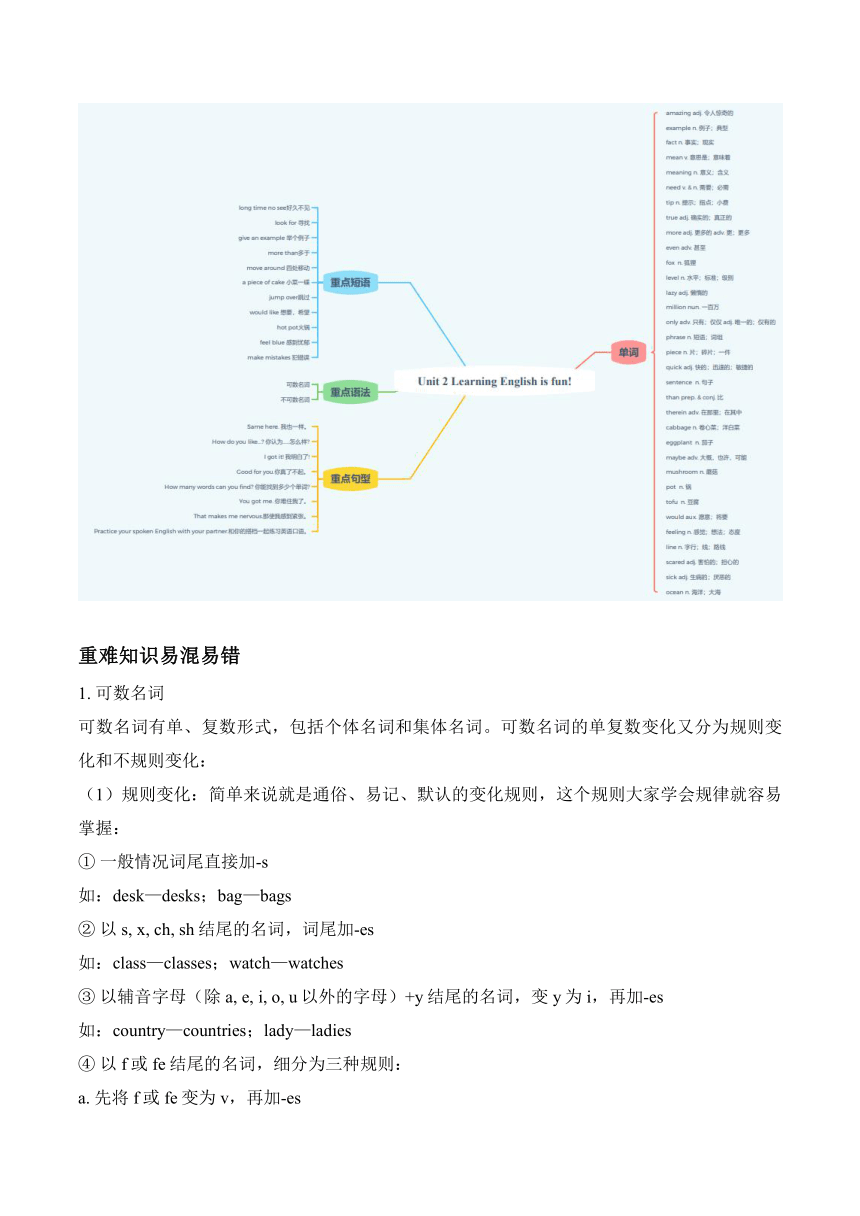
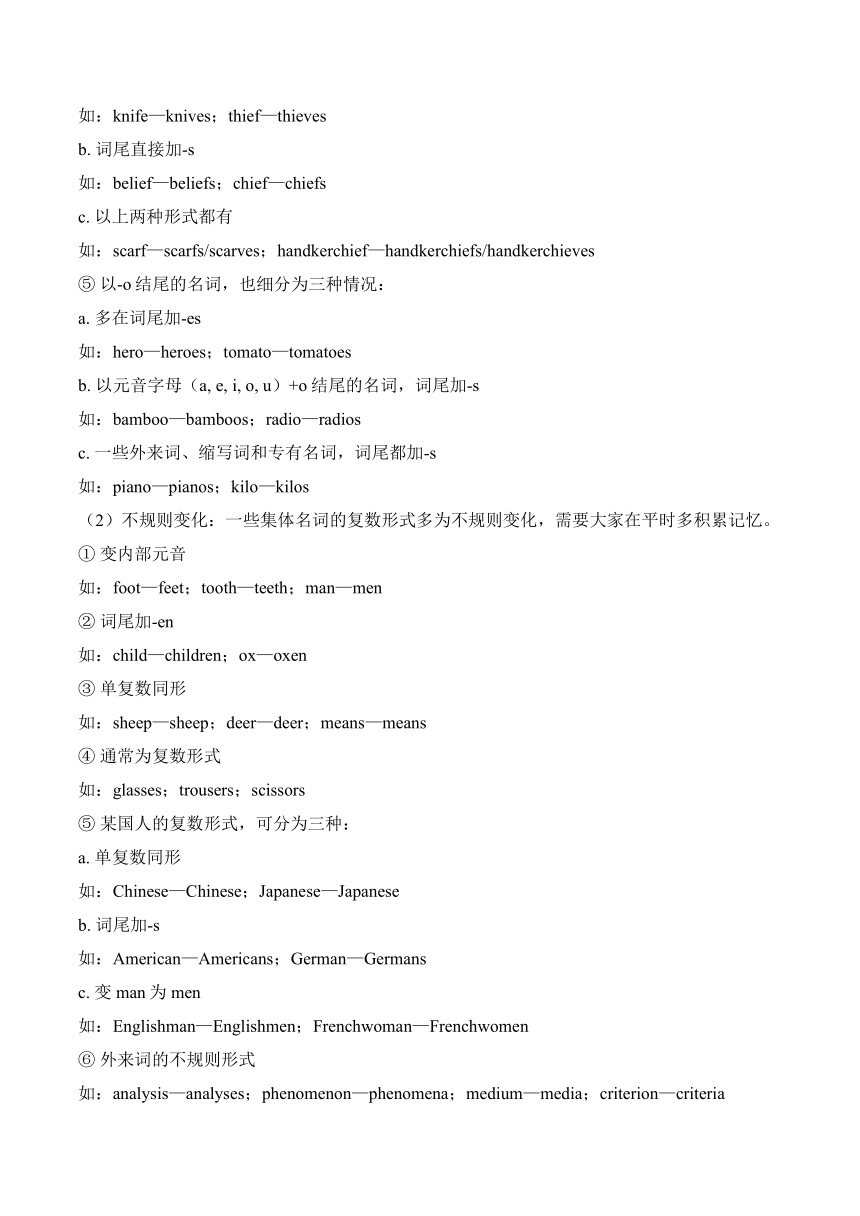
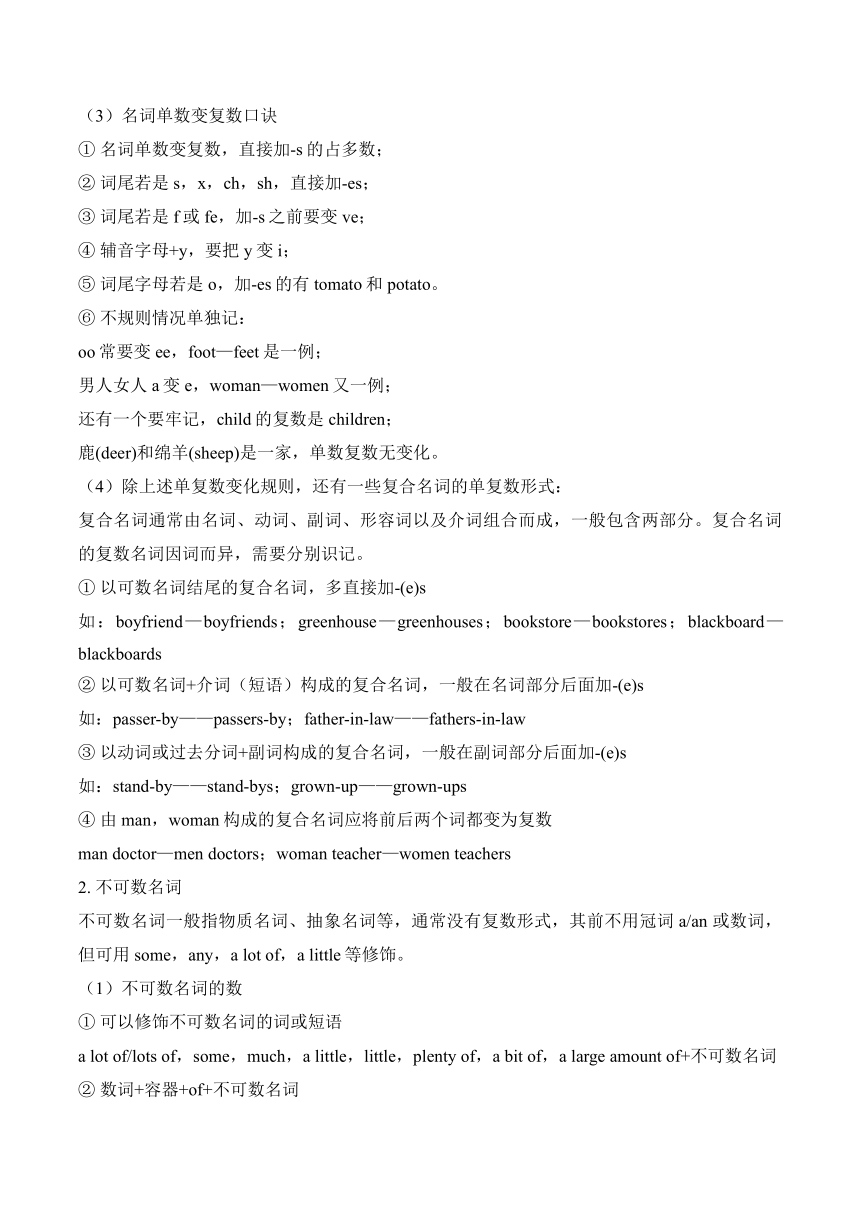
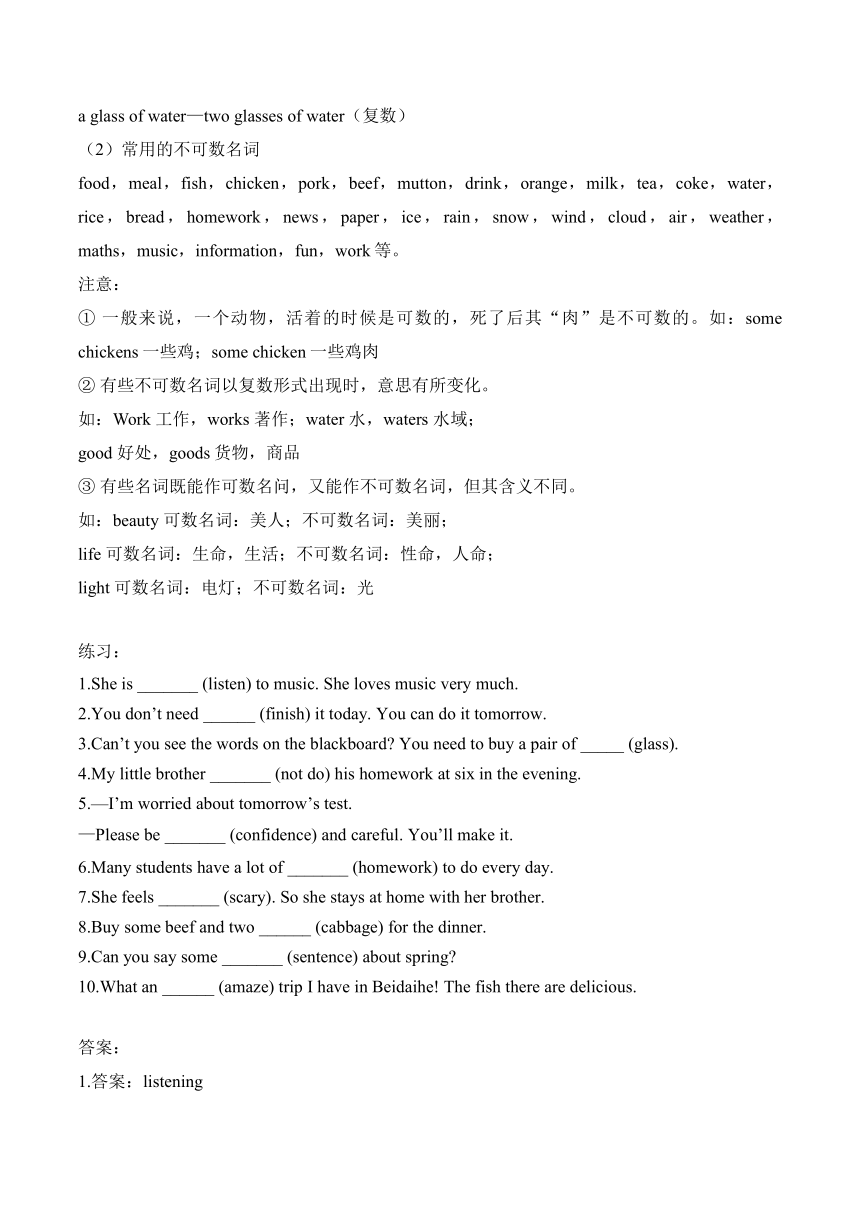
文档简介
Unit 2 Learning English is fun!期末复习考点讲义
学习目标整合
语言能力 能够掌握与英语学习相关的词汇、短语和句型,并能在日常交流和书面表达中准确运用; 能够听懂、读懂关于英语学习经历和观点的对话、短文,理解大意并获取关键信息,提高听力和阅读理解能力; 用英语表达自己对英语学习的看法和感受,进行简单的口头和书面表达; 提高听说读写能力,尤其是口语表达和简单的书面表达能力。
文化意识 了解英语在不同国家的使用情况和文化背景,认识到英语作为国际语言的重要性; 体会不同文化背景下人们学习英语的方式和态度的差异,拓宽国际视野,培养跨文化交际意识。
思维品质 通过对英语学习相关话题的讨论,探讨学习英语的困难及解决方法; 进行批判性思维,对不同的英语学习方法进行评价和思考; 通过思考对英语的喜好及原因,培养分析、比较和归纳能力; 从不同角度思考英语学习的价值,激发创新思维。
学习能力 掌握有效的英语学习方法,如记忆单词、提高说读写能力的技巧等; 培养自主学习英语的意识和能力,学会利用各种资源学习英语,掌握预习、复习的方法,养成良好的学习习惯; 学会利用多种资源(如词典、网络等)辅助英语学习; 通过小组合作学习,提高合作交流能力和共同解决问题的能力。
思维导图回顾知识
重难知识易混易错
1. 可数名词
可数名词有单、复数形式,包括个体名词和集体名词。可数名词的单复数变化又分为规则变化和不规则变化:
(1)规则变化:简单来说就是通俗、易记、默认的变化规则,这个规则大家学会规律就容易掌握:
① 一般情况词尾直接加-s
如:desk—desks;bag—bags
② 以s, x, ch, sh结尾的名词,词尾加-es
如:class—classes;watch—watches
③ 以辅音字母(除a, e, i, o, u以外的字母)+y结尾的名词,变y为i,再加-es
如:country—countries;lady—ladies
④ 以f或fe结尾的名词,细分为三种规则:
a. 先将f或fe变为v,再加-es
如:knife—knives;thief—thieves
b. 词尾直接加-s
如:belief—beliefs;chief—chiefs
c. 以上两种形式都有
如:scarf—scarfs/scarves;handkerchief—handkerchiefs/handkerchieves
⑤ 以-o结尾的名词,也细分为三种情况:
a. 多在词尾加-es
如:hero—heroes;tomato—tomatoes
b. 以元音字母(a, e, i, o, u)+o结尾的名词,词尾加-s
如:bamboo—bamboos;radio—radios
c. 一些外来词、缩写词和专有名词,词尾都加-s
如:piano—pianos;kilo—kilos
(2)不规则变化:一些集体名词的复数形式多为不规则变化,需要大家在平时多积累记忆。
① 变内部元音
如:foot—feet;tooth—teeth;man—men
② 词尾加-en
如:child—children;ox—oxen
③ 单复数同形
如:sheep—sheep;deer—deer;means—means
④ 通常为复数形式
如:glasses;trousers;scissors
⑤ 某国人的复数形式,可分为三种:
a. 单复数同形
如:Chinese—Chinese;Japanese—Japanese
b. 词尾加-s
如:American—Americans;German—Germans
c. 变man为men
如:Englishman—Englishmen;Frenchwoman—Frenchwomen
⑥ 外来词的不规则形式
如:analysis—analyses;phenomenon—phenomena;medium—media;criterion—criteria
(3)名词单数变复数口诀
① 名词单数变复数,直接加-s的占多数;
② 词尾若是s,x,ch,sh,直接加-es;
③ 词尾若是f或fe,加-s之前要变ve;
④ 辅音字母+y,要把y变i;
⑤ 词尾字母若是o,加-es的有tomato和potato。
⑥ 不规则情况单独记:
oo常要变ee,foot—feet是一例;
男人女人a变e,woman—women又一例;
还有一个要牢记,child的复数是children;
鹿(deer)和绵羊(sheep)是一家,单数复数无变化。
(4)除上述单复数变化规则,还有一些复合名词的单复数形式:
复合名词通常由名词、动词、副词、形容词以及介词组合而成,一般包含两部分。复合名词的复数名词因词而异,需要分别识记。
① 以可数名词结尾的复合名词,多直接加-(e)s
如:boyfriend—boyfriends;greenhouse—greenhouses;bookstore—bookstores;blackboard—blackboards
② 以可数名词+介词(短语)构成的复合名词,一般在名词部分后面加-(e)s
如:passer-by——passers-by;father-in-law——fathers-in-law
③ 以动词或过去分词+副词构成的复合名词,一般在副词部分后面加-(e)s
如:stand-by——stand-bys;grown-up——grown-ups
④ 由man,woman构成的复合名词应将前后两个词都变为复数
man doctor—men doctors;woman teacher—women teachers
2. 不可数名词
不可数名词一般指物质名词、抽象名词等,通常没有复数形式,其前不用冠词a/an 或数词,但可用some,any,a lot of,a little等修饰。
(1)不可数名词的数
① 可以修饰不可数名词的词或短语
a lot of/lots of,some,much,a little,little,plenty of,a bit of,a large amount of+不可数名词
② 数词+容器+of+不可数名词
a glass of water—two glasses of water(复数)
(2)常用的不可数名词
food,meal,fish,chicken,pork,beef,mutton,drink,orange,milk,tea,coke,water,rice,bread,homework,news,paper,ice,rain,snow,wind,cloud,air,weather,maths,music,information,fun,work等。
注意:
① 一般来说,一个动物,活着的时候是可数的,死了后其“肉”是不可数的。如:some chickens一些鸡;some chicken一些鸡肉
② 有些不可数名词以复数形式出现时,意思有所变化。
如:Work 工作,works 著作;water 水,waters 水域;
good 好处,goods货物,商品
③ 有些名词既能作可数名问,又能作不可数名词,但其含义不同。
如:beauty 可数名词:美人;不可数名词:美丽;
life 可数名词:生命,生活;不可数名词:性命,人命;
light 可数名词:电灯;不可数名词:光
练习:
1.She is _______ (listen) to music. She loves music very much.
2.You don’t need ______ (finish) it today. You can do it tomorrow.
3.Can’t you see the words on the blackboard You need to buy a pair of _____ (glass).
4.My little brother _______ (not do) his homework at six in the evening.
5.—I’m worried about tomorrow’s test.
—Please be _______ (confidence) and careful. You’ll make it.
6.Many students have a lot of _______ (homework) to do every day.
7.She feels _______ (scary). So she stays at home with her brother.
8.Buy some beef and two ______ (cabbage) for the dinner.
9.Can you say some _______ (sentence) about spring
10.What an ______ (amaze) trip I have in Beidaihe! The fish there are delicious.
答案:
1.答案:listening
解析:句意:她正在听音乐。她非常喜欢音乐。listen“听”,动词,根据系动词“is”可知,此处用现在进行时,其构成为“am/is/are doing”,故填listening。
2.答案:to finish
解析:句意:你今天不需要完成它。你可以明天做。根据“You don’t need…(finish) it today.”可知,此处为固定短语need to do sth.“需要做某事”,空处应用动词不定式形式to finish作宾语。故填to finish。
3.答案:glasses
解析:句意:你看不到黑板上的字吗?你需要买一副眼镜。此处glass“眼镜”用复数形式glasses。故填glasses。
4.答案:doesn’t do
解析:句意:我弟弟晚上六点不做作业。主语是My little brother是第三人称,谓语动词用三单;谓语动词是do,否定句要借助于does,助动词后接动词原形。故填doesn’t do。
5.答案:confident
解析:句意:——我担心明天的考试。——请自信和细心。你会成功的。所给词confidence为不可数名词“自信”,be动词后接形容词作表语,confidence的形容词形式为confident。故填confident。
6.答案:homework
解析:句意:许多学生每天都有很多家庭作业要做。homework“家庭作业”,不可数名词,故填homework。
7.答案:scared
解析:句意:她感到很害怕。所以她和她的哥哥一起待在家里。scary“吓人的”,形容词,主要用来描述事物本身具有令人害怕的特质;此处表示她感觉很害怕,应用scared“害怕的”,用来描述人的感受。故填scared。
8.答案:cabbages
解析:句意:买些牛肉和两个卷心菜当晚餐。根据“Buy some beef and two…for the dinner.”及提示词可知,此处指的是两个卷心菜,cabbage“卷心菜”,可数名词,作句子的宾语;又因为位于“two”之后,其复数形式“cabbages”,符合语境。故填cabbages。
9.答案:sentences
解析:句意:你能说一些关于春天的句子吗?sentence,可数名词,some一些,修饰可数名词的复数。故填sentences。
10.答案:amazing
解析:句意:我在北戴河的旅行太棒了!那里的鱼很好吃。根据“What an ... trip”可知,此处指一次令人惊喜的旅行,amazing“令人惊喜的”,形容词修饰名词trip。故填amazing。
核心素养对接中考
一、阅读理解
Hello, my name is Alice. Do you want to know something about Chinese food In China, there are many different kinds of food. Among them, dumplings are the real Chinese food. They are really popular.
Everyone in China likes dumplings very much, and there are many different kinds of dumplings. Some have beef and vegetables in them, and some have eggs and carrots in them. I love eating dumplings with vegetables and pork.
The Spring Festival is very important in China. When it comes, we make dumplings, and usually we put a coin in a dumpling. If one eats the dumpling with the coin, he or she will be lucky in the new year.
Welcome to China. I'll ask you to eat the real Chinese food: dumplings.
1.What does the underlined word "popular" mean in Chinese
A.昂贵的 B.受欢迎的 C.普通的 D.奇怪的
2.What kind of dumplings does Alice like
A. Dumplings with beef and vegetables. B. Dumplings with eggs and carrots.
C. Dumplings with vegetables and pork. D. Dumplings with eggs and cabbages.
3.Why do people put a coin in a dumpling
A. Because it is good for health. B. Because they have many coins.
C. Because it is a real Chinese food. D. Because they want to have good luck.
4.What’s the structure of this passage
A. B. C. D.
5.What can be the best title of the passage
A. The real Chinese food B. Alice's favourite vegetables
C. The Spring Festival D. Dumplings with coins
二、情景交际
A: How can I become a good English learner Could you give me some advice, Mr. Liu
B: Of course. Do you learn English by watching English videos
A:① ______
B: How about keeping a diary in English Do you learn English that way
A: Yes. ② ______
B: Have you ever studied with a group
A: Yes, I have. I have learned a lot that way.
B: ③ ______
A: Oh, yes. It proves my spoken English, and my friendships as well.
B: ④ ______
A: I do that sometimes. I think it helps.
B: I do too. ⑤ ______
A: That sounds a good idea!
A.What about reading aloud to practice pronunciation
B.No, it’s too hard to understand the voice.
C.And I always look up new words in a dictionary.
D.It helps to write English every day.
E.Do you ever practice conversations with friends
三、写作
假如你叫Mary,前不久收到了笔友李华的邮件,得知不久他要来伦敦学习英语。他想知道如何学好英语。请你用英语给他回一封邮件,介绍一些学习英语的方法,并提出你的建议。
注意:
1.词数:70词左右,开头和结尾已给出,不计入总词数。
2.文中不得出现真实姓名与学校名称。
Dear Li Hua,
I’m glad you’ll come to London to learn English
____________________________________________________________________________________________________________________________________________________________________________________________________________________________________________________________________________________________________________________________________
Hope to see you soon in London.
Yours,
Mary
答案以及解析
一、阅读理解
1.答案:B
解析:词义猜测题。根据第二段中的"Everyone in China likes dumpling, very much"可知,中国人非常喜欢饺子,说明饺子很受欢迎;因此"popular"的含义为"受欢迎的"。故选B。
2.答案:C
解析:细节理解题。根据第二段中的"I love eating dumplings with vegetables and pork (猪肉)"可知选C。
3.答案:D
解析:细节理解题。根据第三段中的"If one eats the dumpling with the coin, he or she will be lucky in the new year"可知,如果一个人吃了包着硬币的饺子,他或她在新的一年里就会有好运。
4.答案:B
解析:篇章结构题。本文第一段引出主题:中国美食饺[子;第二段介绍饺子的种类,第三段介绍吃饺子的习俗;第四段再次点题。
5.答案:A
解析:标题归纳题。根据第一段中的"Among them, dumplings are the real Chinese food"及全文可知,本文介绍了真正意义上的中国美食—饺子。故选A。
二、情景交际
答案:BDEAC
解析:①根据“Do you learn English by watching English videos ”以及下句“How about keeping a diary in English ”可知,此处是一般疑问句的否定回答。选项B“不,这声音太难听懂了。”符合语境。故选B。
②根据“How about keeping a diary in English Do you learn English that way ”以及“Yes.”可知,此处是对这一方法的认可,选项D“每天写英语很有帮助。”符合语境。故选D。
③根据“Oh, yes. It proves my spoken English, and my friendships as well.”可知,此处与口语练习有关,选项E“你和朋友练习过对话吗?”符合语境。故选E。
④根据“I do that sometimes. I think it helps.”可知,此处是另一种学英语的建议,选项A“大声朗读练习发音怎么样?”符合语境。故选A。
⑤根据“I do too.”及“That sounds a good idea!”可知,此处应该是自己如何学习英语,选项C“我总是在字典里查生词。”符合语境。故选C。
三、写作
答案:
Dear Li Hua,
I’m glad you’ll come to London to learn English.
English is an easy language to learn. Don’t worry about it. First, you can read some English books and look up new words in a dictionary. Second, you can watch English movies and listen to English songs, because they can improve your listening. Third, you must speak English every day. Don’t be afraid of making mistakes. I hope you can learn English well.
Hope to see you soon in London.
Yours,
Mary
学习目标整合
语言能力 能够掌握与英语学习相关的词汇、短语和句型,并能在日常交流和书面表达中准确运用; 能够听懂、读懂关于英语学习经历和观点的对话、短文,理解大意并获取关键信息,提高听力和阅读理解能力; 用英语表达自己对英语学习的看法和感受,进行简单的口头和书面表达; 提高听说读写能力,尤其是口语表达和简单的书面表达能力。
文化意识 了解英语在不同国家的使用情况和文化背景,认识到英语作为国际语言的重要性; 体会不同文化背景下人们学习英语的方式和态度的差异,拓宽国际视野,培养跨文化交际意识。
思维品质 通过对英语学习相关话题的讨论,探讨学习英语的困难及解决方法; 进行批判性思维,对不同的英语学习方法进行评价和思考; 通过思考对英语的喜好及原因,培养分析、比较和归纳能力; 从不同角度思考英语学习的价值,激发创新思维。
学习能力 掌握有效的英语学习方法,如记忆单词、提高说读写能力的技巧等; 培养自主学习英语的意识和能力,学会利用各种资源学习英语,掌握预习、复习的方法,养成良好的学习习惯; 学会利用多种资源(如词典、网络等)辅助英语学习; 通过小组合作学习,提高合作交流能力和共同解决问题的能力。
思维导图回顾知识
重难知识易混易错
1. 可数名词
可数名词有单、复数形式,包括个体名词和集体名词。可数名词的单复数变化又分为规则变化和不规则变化:
(1)规则变化:简单来说就是通俗、易记、默认的变化规则,这个规则大家学会规律就容易掌握:
① 一般情况词尾直接加-s
如:desk—desks;bag—bags
② 以s, x, ch, sh结尾的名词,词尾加-es
如:class—classes;watch—watches
③ 以辅音字母(除a, e, i, o, u以外的字母)+y结尾的名词,变y为i,再加-es
如:country—countries;lady—ladies
④ 以f或fe结尾的名词,细分为三种规则:
a. 先将f或fe变为v,再加-es
如:knife—knives;thief—thieves
b. 词尾直接加-s
如:belief—beliefs;chief—chiefs
c. 以上两种形式都有
如:scarf—scarfs/scarves;handkerchief—handkerchiefs/handkerchieves
⑤ 以-o结尾的名词,也细分为三种情况:
a. 多在词尾加-es
如:hero—heroes;tomato—tomatoes
b. 以元音字母(a, e, i, o, u)+o结尾的名词,词尾加-s
如:bamboo—bamboos;radio—radios
c. 一些外来词、缩写词和专有名词,词尾都加-s
如:piano—pianos;kilo—kilos
(2)不规则变化:一些集体名词的复数形式多为不规则变化,需要大家在平时多积累记忆。
① 变内部元音
如:foot—feet;tooth—teeth;man—men
② 词尾加-en
如:child—children;ox—oxen
③ 单复数同形
如:sheep—sheep;deer—deer;means—means
④ 通常为复数形式
如:glasses;trousers;scissors
⑤ 某国人的复数形式,可分为三种:
a. 单复数同形
如:Chinese—Chinese;Japanese—Japanese
b. 词尾加-s
如:American—Americans;German—Germans
c. 变man为men
如:Englishman—Englishmen;Frenchwoman—Frenchwomen
⑥ 外来词的不规则形式
如:analysis—analyses;phenomenon—phenomena;medium—media;criterion—criteria
(3)名词单数变复数口诀
① 名词单数变复数,直接加-s的占多数;
② 词尾若是s,x,ch,sh,直接加-es;
③ 词尾若是f或fe,加-s之前要变ve;
④ 辅音字母+y,要把y变i;
⑤ 词尾字母若是o,加-es的有tomato和potato。
⑥ 不规则情况单独记:
oo常要变ee,foot—feet是一例;
男人女人a变e,woman—women又一例;
还有一个要牢记,child的复数是children;
鹿(deer)和绵羊(sheep)是一家,单数复数无变化。
(4)除上述单复数变化规则,还有一些复合名词的单复数形式:
复合名词通常由名词、动词、副词、形容词以及介词组合而成,一般包含两部分。复合名词的复数名词因词而异,需要分别识记。
① 以可数名词结尾的复合名词,多直接加-(e)s
如:boyfriend—boyfriends;greenhouse—greenhouses;bookstore—bookstores;blackboard—blackboards
② 以可数名词+介词(短语)构成的复合名词,一般在名词部分后面加-(e)s
如:passer-by——passers-by;father-in-law——fathers-in-law
③ 以动词或过去分词+副词构成的复合名词,一般在副词部分后面加-(e)s
如:stand-by——stand-bys;grown-up——grown-ups
④ 由man,woman构成的复合名词应将前后两个词都变为复数
man doctor—men doctors;woman teacher—women teachers
2. 不可数名词
不可数名词一般指物质名词、抽象名词等,通常没有复数形式,其前不用冠词a/an 或数词,但可用some,any,a lot of,a little等修饰。
(1)不可数名词的数
① 可以修饰不可数名词的词或短语
a lot of/lots of,some,much,a little,little,plenty of,a bit of,a large amount of+不可数名词
② 数词+容器+of+不可数名词
a glass of water—two glasses of water(复数)
(2)常用的不可数名词
food,meal,fish,chicken,pork,beef,mutton,drink,orange,milk,tea,coke,water,rice,bread,homework,news,paper,ice,rain,snow,wind,cloud,air,weather,maths,music,information,fun,work等。
注意:
① 一般来说,一个动物,活着的时候是可数的,死了后其“肉”是不可数的。如:some chickens一些鸡;some chicken一些鸡肉
② 有些不可数名词以复数形式出现时,意思有所变化。
如:Work 工作,works 著作;water 水,waters 水域;
good 好处,goods货物,商品
③ 有些名词既能作可数名问,又能作不可数名词,但其含义不同。
如:beauty 可数名词:美人;不可数名词:美丽;
life 可数名词:生命,生活;不可数名词:性命,人命;
light 可数名词:电灯;不可数名词:光
练习:
1.She is _______ (listen) to music. She loves music very much.
2.You don’t need ______ (finish) it today. You can do it tomorrow.
3.Can’t you see the words on the blackboard You need to buy a pair of _____ (glass).
4.My little brother _______ (not do) his homework at six in the evening.
5.—I’m worried about tomorrow’s test.
—Please be _______ (confidence) and careful. You’ll make it.
6.Many students have a lot of _______ (homework) to do every day.
7.She feels _______ (scary). So she stays at home with her brother.
8.Buy some beef and two ______ (cabbage) for the dinner.
9.Can you say some _______ (sentence) about spring
10.What an ______ (amaze) trip I have in Beidaihe! The fish there are delicious.
答案:
1.答案:listening
解析:句意:她正在听音乐。她非常喜欢音乐。listen“听”,动词,根据系动词“is”可知,此处用现在进行时,其构成为“am/is/are doing”,故填listening。
2.答案:to finish
解析:句意:你今天不需要完成它。你可以明天做。根据“You don’t need…(finish) it today.”可知,此处为固定短语need to do sth.“需要做某事”,空处应用动词不定式形式to finish作宾语。故填to finish。
3.答案:glasses
解析:句意:你看不到黑板上的字吗?你需要买一副眼镜。此处glass“眼镜”用复数形式glasses。故填glasses。
4.答案:doesn’t do
解析:句意:我弟弟晚上六点不做作业。主语是My little brother是第三人称,谓语动词用三单;谓语动词是do,否定句要借助于does,助动词后接动词原形。故填doesn’t do。
5.答案:confident
解析:句意:——我担心明天的考试。——请自信和细心。你会成功的。所给词confidence为不可数名词“自信”,be动词后接形容词作表语,confidence的形容词形式为confident。故填confident。
6.答案:homework
解析:句意:许多学生每天都有很多家庭作业要做。homework“家庭作业”,不可数名词,故填homework。
7.答案:scared
解析:句意:她感到很害怕。所以她和她的哥哥一起待在家里。scary“吓人的”,形容词,主要用来描述事物本身具有令人害怕的特质;此处表示她感觉很害怕,应用scared“害怕的”,用来描述人的感受。故填scared。
8.答案:cabbages
解析:句意:买些牛肉和两个卷心菜当晚餐。根据“Buy some beef and two…for the dinner.”及提示词可知,此处指的是两个卷心菜,cabbage“卷心菜”,可数名词,作句子的宾语;又因为位于“two”之后,其复数形式“cabbages”,符合语境。故填cabbages。
9.答案:sentences
解析:句意:你能说一些关于春天的句子吗?sentence,可数名词,some一些,修饰可数名词的复数。故填sentences。
10.答案:amazing
解析:句意:我在北戴河的旅行太棒了!那里的鱼很好吃。根据“What an ... trip”可知,此处指一次令人惊喜的旅行,amazing“令人惊喜的”,形容词修饰名词trip。故填amazing。
核心素养对接中考
一、阅读理解
Hello, my name is Alice. Do you want to know something about Chinese food In China, there are many different kinds of food. Among them, dumplings are the real Chinese food. They are really popular.
Everyone in China likes dumplings very much, and there are many different kinds of dumplings. Some have beef and vegetables in them, and some have eggs and carrots in them. I love eating dumplings with vegetables and pork.
The Spring Festival is very important in China. When it comes, we make dumplings, and usually we put a coin in a dumpling. If one eats the dumpling with the coin, he or she will be lucky in the new year.
Welcome to China. I'll ask you to eat the real Chinese food: dumplings.
1.What does the underlined word "popular" mean in Chinese
A.昂贵的 B.受欢迎的 C.普通的 D.奇怪的
2.What kind of dumplings does Alice like
A. Dumplings with beef and vegetables. B. Dumplings with eggs and carrots.
C. Dumplings with vegetables and pork. D. Dumplings with eggs and cabbages.
3.Why do people put a coin in a dumpling
A. Because it is good for health. B. Because they have many coins.
C. Because it is a real Chinese food. D. Because they want to have good luck.
4.What’s the structure of this passage
A. B. C. D.
5.What can be the best title of the passage
A. The real Chinese food B. Alice's favourite vegetables
C. The Spring Festival D. Dumplings with coins
二、情景交际
A: How can I become a good English learner Could you give me some advice, Mr. Liu
B: Of course. Do you learn English by watching English videos
A:① ______
B: How about keeping a diary in English Do you learn English that way
A: Yes. ② ______
B: Have you ever studied with a group
A: Yes, I have. I have learned a lot that way.
B: ③ ______
A: Oh, yes. It proves my spoken English, and my friendships as well.
B: ④ ______
A: I do that sometimes. I think it helps.
B: I do too. ⑤ ______
A: That sounds a good idea!
A.What about reading aloud to practice pronunciation
B.No, it’s too hard to understand the voice.
C.And I always look up new words in a dictionary.
D.It helps to write English every day.
E.Do you ever practice conversations with friends
三、写作
假如你叫Mary,前不久收到了笔友李华的邮件,得知不久他要来伦敦学习英语。他想知道如何学好英语。请你用英语给他回一封邮件,介绍一些学习英语的方法,并提出你的建议。
注意:
1.词数:70词左右,开头和结尾已给出,不计入总词数。
2.文中不得出现真实姓名与学校名称。
Dear Li Hua,
I’m glad you’ll come to London to learn English
____________________________________________________________________________________________________________________________________________________________________________________________________________________________________________________________________________________________________________________________________
Hope to see you soon in London.
Yours,
Mary
答案以及解析
一、阅读理解
1.答案:B
解析:词义猜测题。根据第二段中的"Everyone in China likes dumpling, very much"可知,中国人非常喜欢饺子,说明饺子很受欢迎;因此"popular"的含义为"受欢迎的"。故选B。
2.答案:C
解析:细节理解题。根据第二段中的"I love eating dumplings with vegetables and pork (猪肉)"可知选C。
3.答案:D
解析:细节理解题。根据第三段中的"If one eats the dumpling with the coin, he or she will be lucky in the new year"可知,如果一个人吃了包着硬币的饺子,他或她在新的一年里就会有好运。
4.答案:B
解析:篇章结构题。本文第一段引出主题:中国美食饺[子;第二段介绍饺子的种类,第三段介绍吃饺子的习俗;第四段再次点题。
5.答案:A
解析:标题归纳题。根据第一段中的"Among them, dumplings are the real Chinese food"及全文可知,本文介绍了真正意义上的中国美食—饺子。故选A。
二、情景交际
答案:BDEAC
解析:①根据“Do you learn English by watching English videos ”以及下句“How about keeping a diary in English ”可知,此处是一般疑问句的否定回答。选项B“不,这声音太难听懂了。”符合语境。故选B。
②根据“How about keeping a diary in English Do you learn English that way ”以及“Yes.”可知,此处是对这一方法的认可,选项D“每天写英语很有帮助。”符合语境。故选D。
③根据“Oh, yes. It proves my spoken English, and my friendships as well.”可知,此处与口语练习有关,选项E“你和朋友练习过对话吗?”符合语境。故选E。
④根据“I do that sometimes. I think it helps.”可知,此处是另一种学英语的建议,选项A“大声朗读练习发音怎么样?”符合语境。故选A。
⑤根据“I do too.”及“That sounds a good idea!”可知,此处应该是自己如何学习英语,选项C“我总是在字典里查生词。”符合语境。故选C。
三、写作
答案:
Dear Li Hua,
I’m glad you’ll come to London to learn English.
English is an easy language to learn. Don’t worry about it. First, you can read some English books and look up new words in a dictionary. Second, you can watch English movies and listen to English songs, because they can improve your listening. Third, you must speak English every day. Don’t be afraid of making mistakes. I hope you can learn English well.
Hope to see you soon in London.
Yours,
Mary
同课章节目录
